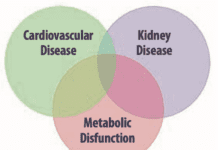An analysis of 19 studies involving 45,637 participants in 16 countries provides the most comprehensive picture to date of how omega-3 fats may influence heart disease. Higher blood levels of omega-3s from seafood as well as plants were associated with a lower risk of dying from heart attacks.
“For the leading cause of death in the world, lowering the risk by about 25% would be quite meaningful,” commented senior study author Dariush Mozaffarian, MD, DrPH, dean of Tufts’ Friedman School and editor-in-chief of the Health & Nutrition Letter. “At a time when some but not other trials of fish oil supplementation have shown benefits, there is uncertainty about cardiovascular effects of omega-3s. Our results lend support to the importance of fish and omega-3 consumption as part of a healthy diet.”
Dreamstime.com


GLOBAL EFFORT: Researchers from around the world joined together to form the Fatty acids and Outcomes Research Consortium (FORCE, <force.nutrition.tufts.edu>). By pooling findings from diverse large studies that had measured blood or tissue levels of omega-3s, scientists could evaluate relationships with heart disease events over time. Overall, 7,973 people experienced a first heart attack, including 2,781 deaths. Results were published in JAMA Internal Medicine.
People with the highest blood levels of omega-3s had about a 25% lower risk of fatal heart attack, compared to people with the lowest levels. But omega-3 levels were not generally associated with a risk of nonfatal heart attacks, suggesting a more specific mechanism for benefits of omega-3s related to death.
“Most prior studies of dietary fats have relied on self-reported estimates of intake,” said Dr. Mozaffarian. “This new global consortium provides an unprecedented opportunity to understand how blood biomarkers of many different fats and fatty acids relate to diverse health outcomes, and many additional investigations are in progress.”
RX FOR FISH: Lead author Liana C. Del Gobbo, PhD, a prior postdoctoral research fellow at Tufts who is now at Stanford University School of Medicine, added, “These new results, including many studies which previously had not reported their findings, provide the most comprehensive picture to date of how omega-3s may influence heart disease. Across these diverse studies, findings were also consistent by age, sex, race, presence or absence of diabetes, and use of aspirin or cholesterol-lowering medications.”
The findings, she said, suggest that physicians should encourage patients to eat a heart-healthy diet of at least two to three servings of fatty fish a week. That’s consistent with recommendations from the American Heart Association.
Fish is the major food source of omega-3 fatty acids, including eicosapentaenoic acid (EPA), docosapentaenoic acid (DPA), and docosahexaenoic acid (DHA). Alpha-linolenic acid (ALA) is the plant-based omega-3 fatty acid found in walnuts, soybean oil, and canola oil and some other seeds and nuts and their oils.
TO LEARN MORE: JAMA Internal Medicine, June 27, 2016—
http://archinte.jamanetwork.com/article.aspx?articleid=2530286
























